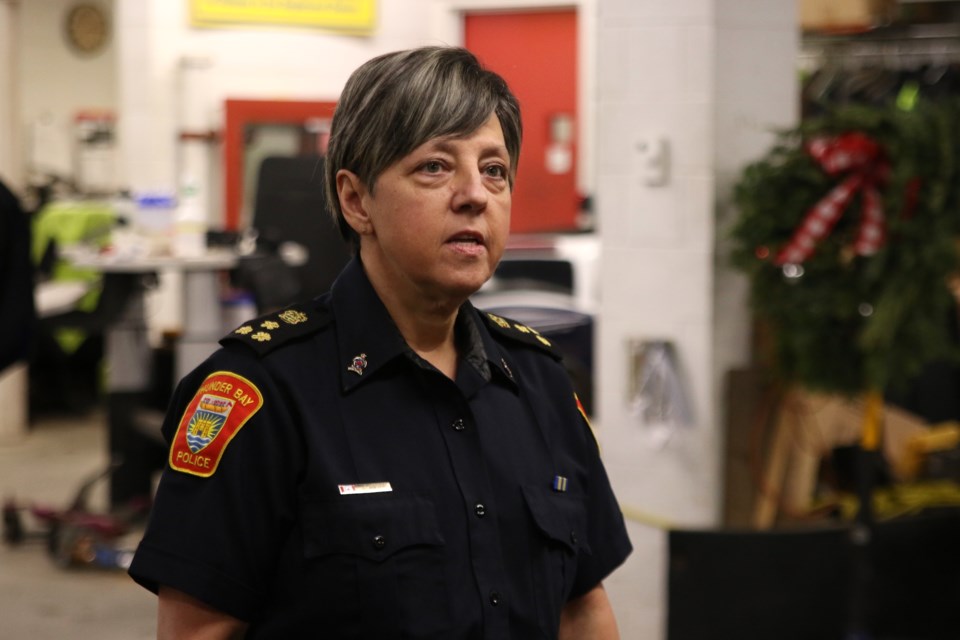THUNDER BAY - The realities of policing have changed significantly in the city of Thunder Bay in recent years, and with addictions, drug trafficking, and a continued increase in calls for service the chief of police says the service does not have the resources needed to meet the needs of the community.
“Our resources are stretched to the limit and we do not have the resources to address this population,” said Thunder Bay Police Service chief Sylvie Hauth during a presentation to the Police Services Board on Tuesday.
In September 2021, Thunder Bay Mayor Bill Mauro requested a report on the redeployment of front-line officers in the service and if anything can be done to meet the growing demand in calls.
On Tuesday, Hauth provided a breakdown of the number of officers deployed in the community and workload they face.
“It was imperative that the board members but also the community understand the realities of policing in Thunder Bay,” she said.
“I can say in the last two years, the landscape of the drug culture has changed dramatically. There has been an increase in drug trafficking, home takeovers, and firearms in the community.”
According to Hauth, between January and November 2021, the Thunder Bay Police Service executed 67 drug warrants, resulting in 310 arrests, 192 of which were on persons from outside of the city.
In that same time period, 767 criminal code charges were laid, 453 of which were drug offences, 21 firearms were seized, along with $3.3 million in drugs and $938,758 in currency.
“Though amazing work is being done by our officers, this is a never-ending battle because of the lucrative nature of the drug trade,” Hauth said.
Gangs from Southern Ontario travel to the city to sell illicit street drugs for more than double the price compared to cities like Toronto or Ottawa. This market results in more crime, including home takeovers and gun violence.
Hauth said there are between 50 to 75 drug houses operating in the city of Thunder Bay. A drug house can bring in as much as $2,800 a day, and the estimated yearly profit from drugs in the city is approximately $46 million.
Drug trafficking is taking another significant toll on the community with 300 overdoses reported between January and November 2021, 77 of which were fatal.
Mauro raised the issue that many offenders arrested on drug charges are often released on bail, only to return to the city to continue participating in criminal activity.
He noted that big city mayors across the province are pushing for bail reforms, adding that perhaps the Police Services Board should also be adding its voice to the conversation.
“We see a lot of people being released on conditions,” Hauth said. “The frustration for us is even people released on conditions leave momentarily and are right back at it.”
Police Service received more than 51,000 calls for service in 2021
The illicit drug trade is not the only challenge facing the Thunder Bay Police Service. It continues to face a high volume of calls for service every year, many of which may not require a police response.
According to Hauth, between January and November 2021, the Police Service received more than 51,000 calls for service, with only 20 per cent being criminal in nature.
“We continue to be the catch all of many calls which should not illicit a response,” she said. “We continue to deal with matters that should be directed to other social agencies.”
This high volume of calls and increasing crime rates is taking a toll on frontline officers and resources. Hauth used the example of time commitments for certain types of calls, including five hours for an assault call, four hours for domestic violence, two hours for liquor licence act violation, five hours for a mental health call involving a suicide attempt, and 25 hours for a sudden death investigation.
In 2021 alone, the Thunder Bay Police Service conducted 321 sudden death investigations.
“Current officer workload and call for service pressures have impacts on officer moral and mental health,” Hauth said. “They deal with time consuming, labour intensive, and at times complex calls.”
Furthermore, while Statistics Canada places Thunder Bay Police Service's jourisdictional population at 118,739, a new report by Anishnawbe Mushkiki estimates the actual population could be between 132,000 and 151,000.
“This is significant and has a large impact on our policing,” Hauth said. “We are unable as a service to be effective and meet all these needs.”
Mauro initially requested the report to learn if there was any way of redeploying officers to meet the growing call volumes.
Of the current sworn members of the Thunder Bay Police Service, 55 per cent are frontline patrol officers, 29.5 per cent are in the Criminal Investigation Branch and Intelligence Unit, 9.5 per cent in the Community Services Branch, and six per cent in court security and senior management.
Mauro asked Hauth if the high complement of members in the Criminal Investigation Branch is due to a recommendation from the Office of the Independent Police Review Board report, which he said the board is not bound by.
“We have implemented many of the recommendations and work continues on others,” he said. “Are you investing in that particular unit because you think it’s the right thing to do or are you doing it because it was recommended by the OIPRD report?”
“The major crime unit is a mandated unit with very specific criteria in terms of work that they do,” Hauth said. “Investment, even without recommendation, requires us to put proper resources there and the call volume.”
Going forward, Hauth said she will be looking into options for a new service delivery model guided by data and the strategic plan, which could see triaging calls for service, differ calls to online or a call back service, and amalgamating units.
Hauth will report back to the Police Services Board in the spring on deployment strategies.